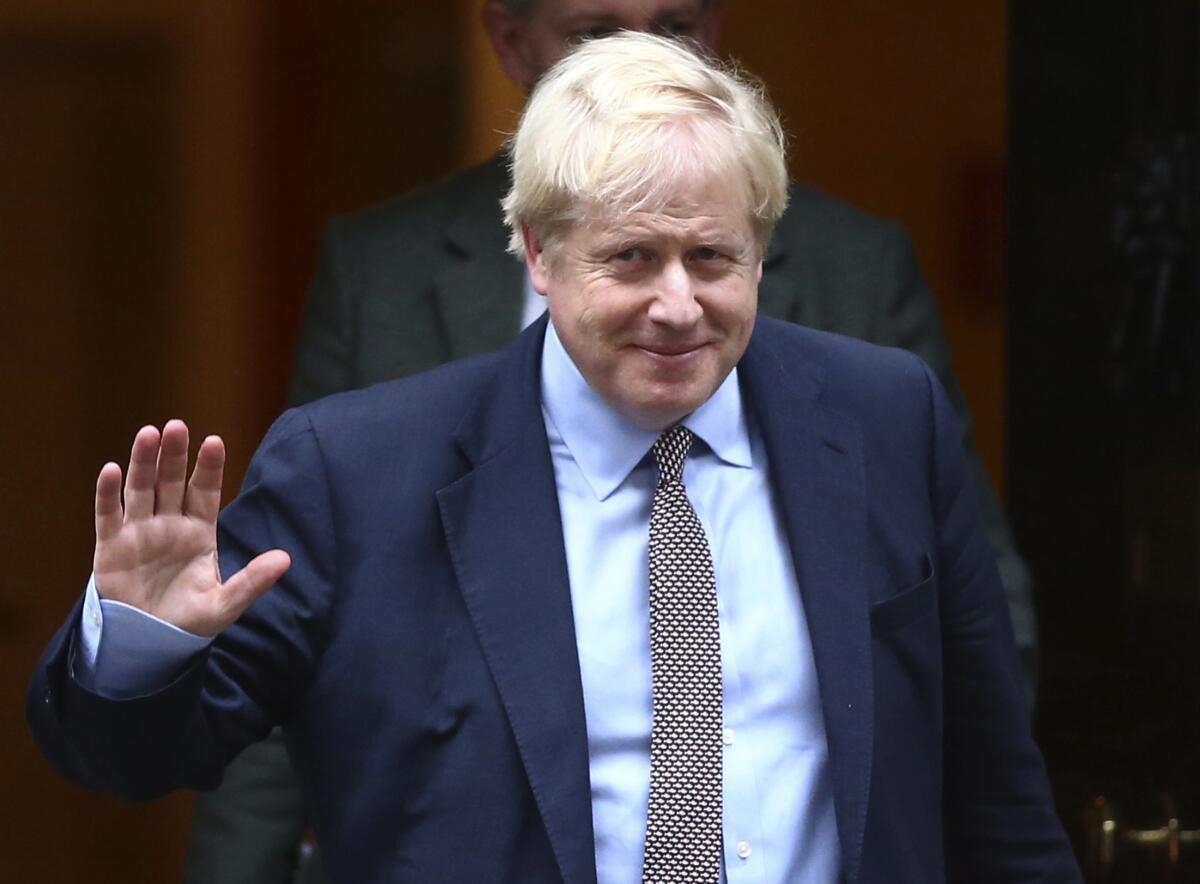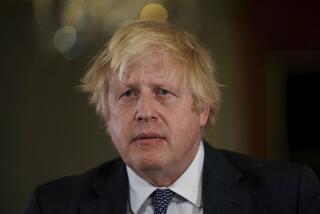Johnson fails to get early election to break Brexit impasse, but he’s not giving up

- Share via
LONDON — Britain got Brexit breathing space but no clarity on Monday when the European Union granted a three-month delay to the U.K.’s departure from the bloc.
British politicians immediately began using the extra time to do what they have done for more than three years — bicker about Brexit.
After a testy debate in the House of Commons, lawmakers rejected Prime Minister Boris Johnson’s call to hold an early election as a way of breaking the political deadlock over the country’s stalled departure from the EU.
Legislators voted by 299-70 for a motion to hold a Dec. 12 election — short of the two-thirds majority of the 650 House of Commons lawmakers needed for it to pass.
Still, an election appears inevitable ahead of the next scheduled one in 2022 if Britain is to move on from the stasis caused by a prime minister who vowed to deliver Brexit “do or die” and a Parliament that has repeatedly thwarted him.
Johnson said he would try again this week, using a different procedure — a bill, which needs only a simple majority to pass.
“The only way to get Brexit done is to go to the people of this country,” Johnson told legislators, accusing his opponents of betraying voters’ decision to leave the EU.
He said that unless there was an election, the government would be “like Charlie Brown, endlessly running up to kick the ball only to have Parliament whisk it away.”
“We cannot continue with this endless delay,” he added.
Yet further delay stretched ahead after the EU agreed to postpone Brexit until Jan. 31, acting to avert a chaotic U.K. departure just three days before Britain was due to become the first country ever to leave the 28-nation bloc.
After a short meeting of diplomats in Brussels, European Council President Donald Tusk tweeted that the EU’s 27 other countries would accept the U.K.’s request for a “flextension.” Under the terms of the agreement, the U.K. can leave before Jan. 31 if the British and European parliaments both ratify a Brexit divorce agreement, either on Dec. 1 or Jan 1.
The delay is the third time the Brexit deadline has been changed since British voters decided in a 2016 referendum to leave the bloc.
The decision was welcomed by politicians in the U.K. and the EU as a temporary respite from Brexit anxiety — but not by Johnson, who said just weeks ago that he would “rather be dead in a ditch” than postpone the U.K.’s leaving date past Oct. 31.
In the end, the choice was not in his hands. The U.K. Parliament forced Johnson to ask for a delay to avoid a no-deal Brexit, which would hurt the economies of both Britain and the EU.
In a letter to Tusk, Johnson said that under U.K. law, “I have no discretion to do anything other than confirm the U.K.’s formal agreement to this extension.”
But he called the delay “unwanted” and said it was “imposed on this government against its will.”
Johnson urged the 27 other EU countries “to make clear that a further extension after 31 January is not possible.”
Johnson took office in July vowing to “get Brexit done” after his predecessor, Theresa May, resigned in defeat. Parliament had rejected her divorce deal with the bloc three times, and the EU had delayed Britain’s scheduled March 29 departure, first to April, and then to October.
Johnson has faced similar political gridlock, as Parliament blocked his attempt to push through his Brexit deal before the October deadline and made him ask the EU for more time.
Johnson hopes voters will give his Conservative Party a majority if there is an election, allowing the prime minister to push through the divorce deal he struck with the EU and — finally — take Britain out of the bloc.
Opposition parties also want an election, though not on Johnson’s terms. The main opposition Labor Party said it would study the government’s bill before deciding whether to back it.
There’s also a chance an election could produce a Parliament as divided over Brexit as the current one. All the political parties in Britain are worried about a backlash from grumpy voters asked to go to the polls at the darkest, coldest time of the year. Britain has not had a December election in almost a century.
European officials, meanwhile, urged Britain not to waste the extra Brexit time.
German government spokesman Steffen Seibert welcomed the Brexit delay, but cautioned Britain to “use the additional time productively.”
Guy Verhofstadt, head of the European Parliament’s Brexit group, wrote on Twitter that “whether the UK’s democratic choice is revoke or an orderly withdraw, confirmed or not in a second referendum, the uncertainty of Brexit has gone on for far too long. This extra time must deliver a way forward.”
France was initially reluctant to extend the Brexit deadline beyond Oct. 31, but European Affairs Minister Amelie de Montchalin said the prospect of a new election in Britain justified the new delay. De Montchalin also said it was not too late for Britain to revoke Article 50 of the EU treaty and cancel Brexit — something that Johnson has vowed he will never do.
“The prime minister can pick up his phone and call Brussels to say: “I stop everything,’” she said.
More to Read
Sign up for Essential California
The most important California stories and recommendations in your inbox every morning.
You may occasionally receive promotional content from the Los Angeles Times.










